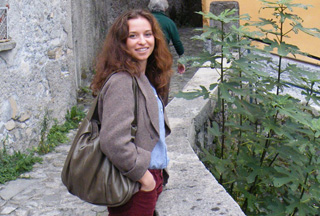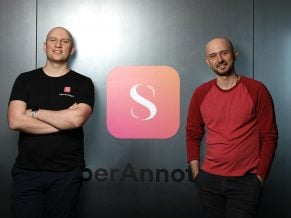“In Armenia a scientist has to find a businessman for support, while in Germany it is the vice versa…”

Anna Chenterechyan lives in Germany and works on doctor’s thesis in Hohenheim university of Stutgart. The topic of her research is food supply, especially the related role of non-for-profit organizations in solving agricultural problems. A. Chenterechyan is researching this issue in Armenia and Georgia.
Before going to Germany Anna graduated from Yerevan State University, faculty of psychology, after which she continued her education in Hungary, at Central European University. In 2004 she returned to Armenia and started working not as a scientist, but in an international non-for-profit organization.
-Why did you decide to go abroad to work on your scientific research?
-I always wanted to continue my education and I decided to take post-graduate courses abroad because what I wanted to do was not available in Armenia, so I decided to continue my education abroad. I don’t know what the situation is now, but at that time professors in Armenia had a very narrow specialization and they could help you with specific narrow matters only, but I needed something more and broader. This was the main reason for leaving for Germany.
However, there was a personal reason too; my husband is a scientist and we were looking for a place where there would be universities for both of us. For example, during my stay in Hungary I learnt that a scientist can have different opportunities to meet, listen to and take skills form professors of other universities too, but in Armenia there was no opportunity like that.
In Armenia you can see the professors of your specific department only, but in Europe the education system gives you more opportunities. It is very good that during studies for bachelor’s degree they show and explain everything to students, but in studies for master’s degree students must be taught to the ability of working on their own and being able to think independently.
Young scholars should be able to express their own opinions to the extent of even being able to criticize their professors and disagree with them. I see in Armenian youth such complexes of expressing their own opinion, especially the ones that are new students here.
They have this problem and they think they cannot disagree with a professor. Professors often make students agree with their viewpoint too. The lack of financial resources and other opportunities to makes scientific experiments limit the potential of students too. As a result, students have two choices; they have to either do their best to be “approved” by their professors or find a richer and liberal university. The American University in Armenia is an example. For many disciplines in Armenia there is no opportunity to do more than the theoretic work for their diploma as there are no financial resources for that. However, in Europe such opportunities exist.
-Do you mean that for young scholars, who want to continue their education and advance in science, are faced with a number of challenges?
-There are many challenges in all sectors of science. There are very limited opportunities to be engaged in social sciences in Armenia for the future; the only opportunity for growth is staying with their universities as teachers after graduation. It makes me nervous that in Armenia universities are not connected and do not cooperate. Due to this lack of collaboration universities stagnate. In order to succeed in sciences there must be good labs, equipments, flexible professors, who are updated with the latest developments in science. The lack of all what I said or shortcomings in this sector stimulate brain drain and emigration of scientists.
-You tackled the situation in Armenia. Now let’s speak about Germany. What new and interesting things did you see there?
-Let’s starts from criticizing. I can compare with universities and education system in two countries – Hungary and Germany. Generally the process of education there is more difficult compared to Armenia. In those countries professors are under strong pressure and they have to publish a lot of scientific researches and articles to keep their reputation up. This is very positive. For example, feel proud for having professors that are famous and publish many scientific articles. In Armenia there are few professors who work and publish articles for international scientific magazines. Some professors of Yerevan State University publish articles from time to time, but maximum in Russian magazines. Of course when saying this I don’t mean a number of really dedicated professors who dedicate their life to universities and do their best to come up with publications in international magazines.
Of course, under the pressure of the professors here, their efforts to lecture abroad (often in Germany) sometimes has the opposite effect and the home assignments are more compared to Armenia. In particular, several MA students of my university pass many of the subjects with the squeezed curriculum.
Having said, the students are more available for doing research and for in-class assignments. Of course, I graduated the graduate school 10 years ago in Armenia and perhaps here many things might have been changed as well but one thing is clear for sure. In Armenia students have limited opportunities to access international electronic libraries for their research and analytic works.
This is the minimum a university should provide to students. The fact that students are not well-aware of the research tools and cannot independently research and analyze even more jeopardize their future as specialists. The students must be offered the hands-on research tools and opportunities from the freshman years of BA.
-As a main reason for the problems of the scientific sector of Armenia people mention the low level financing of the sector. Are there such issues in Germany or not?
-Here there are numerous resources of science financing. First the state funds the universities, where the main scientific potential is concentrated. Researchers are mostly financed by state or private resources.
They come from various German foundations, which are very common here. The EU grants are also quite common here. It is worth mentioning that not all the scientific grants affect the wages of professors, which are provided by the universities but in the scientific sector in order to have a high rating these researches are considered a necessary condition.
But often as a result the wages of certain scientists, mostly junior scientists, are covered. The expenses of paper writing can also be covered in the framework of research activities. It creates conditions for competition. The teaching personnel may have contracts with universities for the period of 12-15 years. But the scientist may stay in the university or the scientific center if he works for some foundation and the latter covers his/her expenses. I think this makes the scientist to work more productively.
Besides that, these foundations create certain interests to big business corporations. For example, I live in a city, where there are a number of giant car producing companies, which finance the main researches related to their field. Unfortunately, in Armenia the scientists should find a businessman to interest him with his work. But here we have the opposite picture, because the businesses are seeking the scientists.
-What is the reputation of scientists in Germany? Do people have special attitude to them?
-In Germany scientists have a big reputation, especially if he is already a professor. But it’s very important to retain the reputation and not to devaluate it. For example, in 2011 the defense minister of Germany had to resign after it was found out that during his college years he had plagiarized. As a result, he had lost both his post and his scientific title. The fact of plagiarism made lots of people angry and I even remember that in our university the professors would start a signature collection campaign against this phenomenon. Here everybody is so scared from the first year in college that whenever they are writing something they write the name of the source in the parenthesis in order to avoid threats of plagiarism. As of Armenia, there is even no need to speak about scientific levels…
By Lusine Movsisyan

























